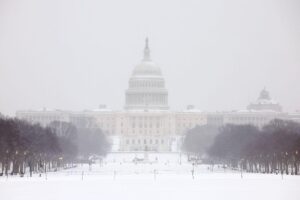HSBC Bad Debt Provisions Surge: How the Growing Trade War Threatens Global Finance sets off global alarms today, highlighting how escalating trade tensions between the United States and China are impacting the world’s biggest banks. HSBC’s decision to raise its bad debt reserves is a major signal for the U.S. economy and businesses, warning of potential credit tightening and a wider financial slowdown.
Understanding Why HSBC Is Raising Its Bad Debt Provisions
Bad debt provisions are money that banks set aside when they expect that borrowers might fail to repay loans.
When a major global bank like HSBC increases these reserves, it is preparing for tougher financial times. This move comes after rising concerns over the ongoing trade war and slowing global economic growth.
HSBC Bad Debt Provisions, Key Reasons for HSBC’s Action:
- Rising risk of loan defaults among businesses affected by tariffs and global trade slowdowns.
- Anticipation of a global economic slowdown hitting both corporate and individual borrowers.
- A broader shift among global banks towards more conservative risk management strategies.
What Are Bad Debt Provisions? Explained for Readers
Bad debt provisions act like a “safety net” for banks.
They are financial cushions that ensure banks remain stable even if many customers fail to pay back loans.
| Term | Simple Definition |
|---|---|
| Bad Debt Provision | Funds set aside to cover potential loan defaults. |
| Purpose | To protect the bank’s balance sheet from unexpected losses. |
| Trigger Events | Trade wars, economic slowdowns, rising unemployment rates. |
Example:
If an American company defaults on a $10 million loan due to trade tariffs increasing costs, HSBC would use its bad debt provision to cover the loss, avoiding a direct hit to profits.
HSBC’s Recent Data: A Sharp Jump in Bad Debt Protection
| Year | HSBC’s Bad Debt Provisions | Yearly Change (%) |
|---|---|---|
| 2023 | $2.7 Billion | – |
| 2024 | $4.1 Billion | +51.8% Increase |
(Source: HSBC Annual Financial Reports 2024)
Insight:
A 51.8% rise within a year is not normal. It reflects HSBC’s expectation of widespread financial stress if the global trade tensions worsen.
How the U.S.–China Trade War Directly Impacts HSBC and the Global Economy
The U.S.–China trade war has deep consequences beyond just tariffs. It is changing how companies borrow, invest, and grow.
HSBC, being deeply involved in global finance, is particularly vulnerable.
HSBC Bad Debt Provisions, Main Impacts of the Trade War on Banking and Finance:
| Trade War Effect | Impact on Banks (Like HSBC) |
|---|---|
| Higher tariffs | Slower business growth, leading to higher defaults |
| Supply chain disruptions | Revenue loss for borrowers, risking loan repayments |
| Market uncertainty | Reduced investment demand and credit availability |
Data Note:
According to the World Bank 2025 Global Outlook, global GDP growth could slow by 0.6% this year because of trade disputes.
HSBC’s Strategic Moves to Navigate Uncertainty
HSBC is not just waiting for trouble — it is proactively adjusting its global strategy.
Key Strategic Responses:
- Stricter Lending Standards: Approving fewer loans to risky borrowers.
- Geographic Diversification: Expanding into regions less affected by trade tensions.
- Strengthening Balance Sheet: Building larger capital buffers to absorb any shocks.
These strategic changes aim to protect the bank and its investors from the unpredictable impacts of trade wars.
What This Means for U.S. Consumers and Businesses
HSBC Bad Debt Provisions, American businesses and consumers will likely feel HSBC’s cautious approach in several ways:
| Effect on U.S. Market | Real-World Impact |
|---|---|
| Tighter credit policies | Harder to get business loans or personal credit |
| Higher interest rates on loans | Costlier borrowing for businesses and individuals |
| Slower business investments | Companies delay hiring and expansion due to loan costs |
Small businesses, startups, and consumers should prepare for stricter lending environments throughout 2025.
HSBC in the Broader Banking Landscape
HSBC’s move mirrors what many global banks are doing.
JPMorgan, Citi, and Barclays have also boosted their bad debt reserves, signaling a broader banking trend toward caution.
| Bank | Recent Bad Debt Provision Actions |
|---|---|
| HSBC | +51.8% provision increase |
| JPMorgan | +35% provision increase |
| Citi | +42% provision increase |
The banking sector’s cautious stance should be seen as an early warning system for potential financial turbulence.
HSBC’s Decision and Its Ripple Effects
Here’s a simple view to understand the big picture:
[Global Trade War]
↓
[Business Slowdowns]
↓
[Loan Repayment Risk ↑]
↓
[HSBC Raises Bad Debt Provisions]
↓
[Tighter Credit for U.S. Consumers and Companies]
↓
[Slower Economic Growth]
Final Thoughts: Why It Matters for USA Readers
HSBC’s bad debt provision surge is not just a banking move — it is a reflection of growing global economic anxiety.
For U.S. readers, it’s a wake-up call to:
- Review personal and business finances carefully.
- Prepare for tighter lending environments.
- Stay updated on global financial trends that could impact local economic conditions.
By understanding these moves early, readers can make smarter financial decisions during uncertain times.





